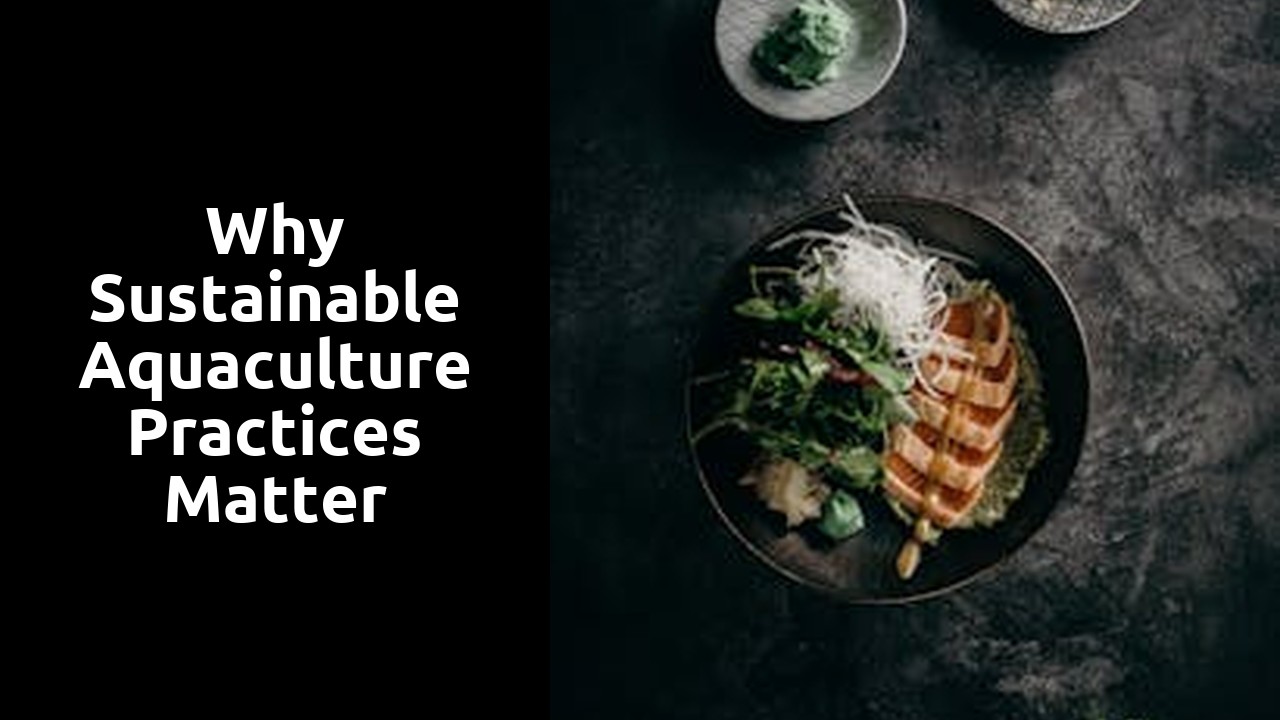Why Sustainable Aquaculture Practices Matter

Impact of Sustainable Aquaculture on Ecosystems
Sustainable aquaculture practices play a pivotal role in safeguarding the delicate balance of marine ecosystems. By implementing responsible farming methods, such as efficient waste management and avoiding the use of harmful chemicals, aquaculture can help mitigate the detrimental effects on marine habitats. Overfishing and pollution are two significant threats to marine ecosystems, but sustainable aquaculture offers a viable solution to alleviate these pressures and promote environmental conservation.
Furthermore, sustainable aquaculture can contribute to the restoration of degraded marine environments. Through practices like integrated multi-trophic aquaculture, where different species are cultivated together to mimic natural ecosystems, aquaculture can help regenerate biodiversity and enhance ecosystem resilience. By nurturing a healthy marine environment, sustainable aquaculture not only benefits the species being farmed but also the entire ecosystem, fostering long-term sustainability and biodiversity conservation.
Preservation of Biodiversity Through Sustainable Practices
Preservation of biodiversity is a critical component of sustainable aquaculture practices. By implementing measures to protect and enhance biodiversity within aquatic ecosystems, we can help maintain the delicate balance of marine life. Sustainable practices such as reducing the use of antibiotics, avoiding overstocking, and implementing responsible feeding practices can all contribute to safeguarding the diversity of species and habitats in our oceans.
Biodiversity is not only essential for the health of aquatic ecosystems but also plays a crucial role in ensuring the resilience of marine populations in the face of environmental challenges. By protecting the genetic diversity of aquatic species, sustainable aquaculture practices can help increase their ability to adapt to changing ocean conditions, such as rising temperatures and ocean acidification. Through a commitment to preserving biodiversity, we can help safeguard the future of our oceans and ensure the long-term sustainability of aquaculture operations.
Consumer Awareness and Sustainable Seafood
Sustainable seafood is not only a matter of environmental concern but also a crucial aspect of creating a more ethical and responsible food industry. As consumers become more informed about the impact of their food choices, there is a growing recognition of the importance of supporting sustainable aquaculture practices. By choosing to purchase seafood that has been sourced responsibly, consumers can play a significant role in promoting a more sustainable future for our oceans and marine ecosystems.
Educating consumers about sustainable aquaculture practices is key to fostering a greater understanding of the complexities of the seafood industry. By raising awareness about the benefits of sustainable seafood, consumers can make more informed decisions when selecting their purchases. Whether through labelling schemes, educational campaigns, or transparent information provided by retailers, there are various avenues through which consumers can access the knowledge needed to support the growth of sustainable aquaculture.
Educating Consumers on the Importance of Sustainable Aquaculture
Educating consumers on the significance of sustainable aquaculture is crucial for fostering a culture of responsible seafood consumption. By highlighting the importance of choosing sustainably sourced seafood, consumers can make informed decisions that support the long-term health of our oceans. Understanding the impact of aquaculture practices on marine ecosystems empowers individuals to select seafood products that have been produced in environmentally friendly ways, thereby reducing the depletion of aquatic resources and protecting fragile marine habitats.
Promoting consumer awareness around sustainable aquaculture involves emphasising the connection between everyday seafood choices and broader environmental consequences. Engaging consumers through campaigns, educational materials, and labelling initiatives can help raise consciousness about the intricacies of seafood production and encourage a shift towards supporting fisheries and aquaculture operations that prioritise sustainability. By equipping consumers with knowledge about sustainable aquaculture practices, we can nurture a sense of responsibility towards our marine ecosystems and contribute to the conservation of marine biodiversity for generations to come.
Future Trends in Sustainable Aquaculture
Sustainable aquaculture is rapidly evolving to meet the increasing demand for seafood while also addressing environmental concerns. One future trend in sustainable aquaculture is the development of integrated multitrophic aquaculture (IMTA) systems. IMTA involves cultivating multiple species in the same area, where waste from one species becomes nutrients for another. This practice not only increases resource efficiency but also reduces environmental impact by mimicking natural ecosystem processes.
Another emerging trend is the use of Recirculating Aquaculture Systems (RAS) which aim to minimise water usage and pollution by recycling and treating water within closed systems. RAS technology allows for precise control over water quality parameters, reducing the risk of disease outbreaks and improving fish welfare. Additionally, advancements in automation and monitoring tools are enhancing the efficiency and sustainability of aquaculture operations, helping producers make informed decisions to optimise production while minimising environmental impact.
Potential Developments in Sustainable Aquaculture Technologies
In the realm of sustainable aquaculture, ongoing developments in technology continue to inspire optimism for a more environmentally-friendly industry. Cutting-edge advancements in aquaculture equipment aim to enhance efficiency while minimising environmental impact. Innovations such as recirculating aquaculture systems (RAS) utilise water filtration and purification processes to reduce waste and pollution, promoting a more sustainable approach to farming aquatic organisms.
Furthermore, the integration of artificial intelligence and data analytics in aquaculture management shows promise in maximising production yield while optimising resource utilisation. Automated feeding systems and monitoring tools allow for precise control over feeding schedules and environmental conditions, ensuring the well-being of fish stocks and minimising excess feed waste. These technological enhancements not only boost productivity in aquaculture but also underscore the industry's commitment to sustainable practices and environmental stewardship.
Related Links
Why Aquaculture Environmental Impact Should Be ConsideredWhat Are the Environmental Impacts of Aquaculture?
Roundup of Sustainable Aquaculture Practices
Review of Aquaculture Certification and Labeling
5 Sustainable Aquaculture Practices You Should Know
The History of Aquaculture Practices